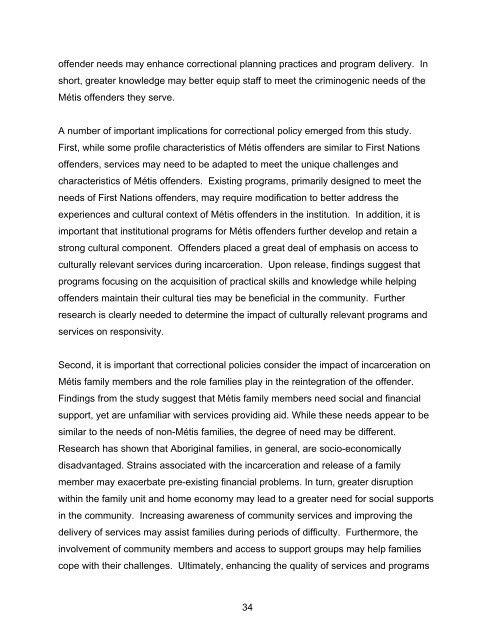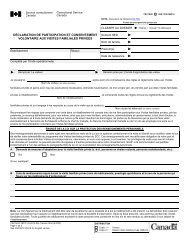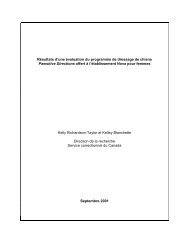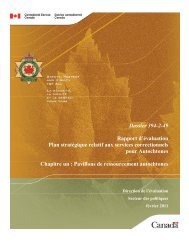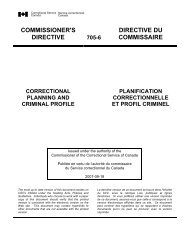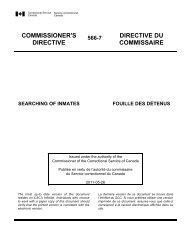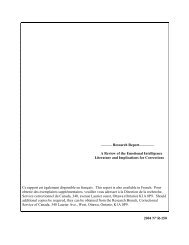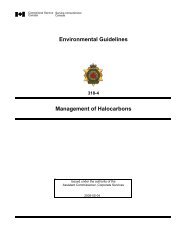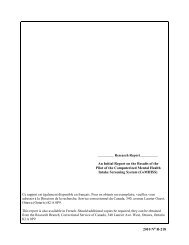Program and Service Needs of Federally Incarcerated Métis ...
Program and Service Needs of Federally Incarcerated Métis ...
Program and Service Needs of Federally Incarcerated Métis ...
You also want an ePaper? Increase the reach of your titles
YUMPU automatically turns print PDFs into web optimized ePapers that Google loves.
<strong>of</strong>fender needs may enhance correctional planning practices <strong>and</strong> program delivery. In<br />
short, greater knowledge may better equip staff to meet the criminogenic needs <strong>of</strong> the<br />
<strong>Métis</strong> <strong>of</strong>fenders they serve.<br />
A number <strong>of</strong> important implications for correctional policy emerged from this study.<br />
First, while some pr<strong>of</strong>ile characteristics <strong>of</strong> <strong>Métis</strong> <strong>of</strong>fenders are similar to First Nations<br />
<strong>of</strong>fenders, services may need to be adapted to meet the unique challenges <strong>and</strong><br />
characteristics <strong>of</strong> <strong>Métis</strong> <strong>of</strong>fenders. Existing programs, primarily designed to meet the<br />
needs <strong>of</strong> First Nations <strong>of</strong>fenders, may require modification to better address the<br />
experiences <strong>and</strong> cultural context <strong>of</strong> <strong>Métis</strong> <strong>of</strong>fenders in the institution. In addition, it is<br />
important that institutional programs for <strong>Métis</strong> <strong>of</strong>fenders further develop <strong>and</strong> retain a<br />
strong cultural component. Offenders placed a great deal <strong>of</strong> emphasis on access to<br />
culturally relevant services during incarceration. Upon release, findings suggest that<br />
programs focusing on the acquisition <strong>of</strong> practical skills <strong>and</strong> knowledge while helping<br />
<strong>of</strong>fenders maintain their cultural ties may be beneficial in the community. Further<br />
research is clearly needed to determine the impact <strong>of</strong> culturally relevant programs <strong>and</strong><br />
services on responsivity.<br />
Second, it is important that correctional policies consider the impact <strong>of</strong> incarceration on<br />
<strong>Métis</strong> family members <strong>and</strong> the role families play in the reintegration <strong>of</strong> the <strong>of</strong>fender.<br />
Findings from the study suggest that <strong>Métis</strong> family members need social <strong>and</strong> financial<br />
support, yet are unfamiliar with services providing aid. While these needs appear to be<br />
similar to the needs <strong>of</strong> non-<strong>Métis</strong> families, the degree <strong>of</strong> need may be different.<br />
Research has shown that Aboriginal families, in general, are socio-economically<br />
disadvantaged. Strains associated with the incarceration <strong>and</strong> release <strong>of</strong> a family<br />
member may exacerbate pre-existing financial problems. In turn, greater disruption<br />
within the family unit <strong>and</strong> home economy may lead to a greater need for social supports<br />
in the community. Increasing awareness <strong>of</strong> community services <strong>and</strong> improving the<br />
delivery <strong>of</strong> services may assist families during periods <strong>of</strong> difficulty. Furthermore, the<br />
involvement <strong>of</strong> community members <strong>and</strong> access to support groups may help families<br />
cope with their challenges. Ultimately, enhancing the quality <strong>of</strong> services <strong>and</strong> programs<br />
34


